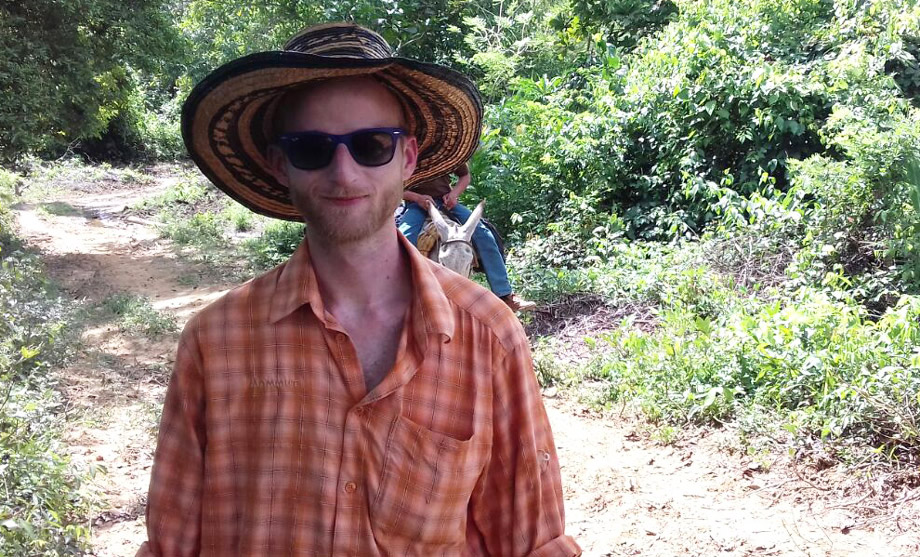Navigation auf uzh.ch
Navigation auf uzh.ch
Gold mining in Colombia is deeply entangled with decades of internal armed conflict. Various interests clash. PhD student Christoph Kaufmann is researching sustainable solutions.

Colombia is at a crossroads: most of the illegally armed groups that participated in more than 50 years of armed conflict are officially demobilised. However, this stability is very fragile and new armed groups have been emerging. The state is trying to restore its public authority in the conflict zones, for example by pushing the implementation of state regulations. Gold mining is deeply entangled with the conflict because it is one of the main sources of income for criminal actors, but also for people living in mining regions. This is why gold mining is a good case to study the impacts of increasing regulation on livelihoods.
The special thing about Colombia is that most of its gold is produced in small-scale mines. Even though in many regions access to the gold-rich underground has been privatised, informal, traditional gold mining continues. Although informal mining is strictly speaking outside the law, it is not necessarily illegitimate in the gold-mining regions. Regulations are now being implemented to formalize the activities of small-scale miners as subcontractors of the title holders. This means that the title holders will release parts of their licences for a limited period so that small-scale miners can continue their activities. However, the title holder dictates the conditions which the small-scale miners don't want to accept because they perceive them as disadvantageous and as a means to create new dependencies.
The local authorities have a difficult role to play: they have to formalise small-scale mining, but they know that the villages depend on this sector to survive. Almost everything there is connected to gold mining, from extraction and commodification to local businesses and the alimentation of workers. If small-scale mining were to disappear, this would be a major problem for the villages.
Yes, mercury is used in small-scale mining to extract the gold from the rocks. If no precautions are taken, mercury is released into the atmosphere. It then enters the human body through inhalation or the food chain, with the known harmful effects.
As of 2013, there is a UN Convention to reduce the use of mercury. Switzerland also played an important role in the negotiations. As a result, Colombia banned the use of mercury in mining as of mid-2018. However, small-scale miners hardly have access to mercury-free processing facilities. My hypothesis is that the state is instrumentalising the harmfulness of mercury in order to establish a new form of public authority. This triggers new conflicts because the small-scale miners feel misunderstood and criminalized.
By analysing the dynamics on different geographical scales, I try to understand the complex issue. I do research in Segovia, the village of my case study, with the provincial authorities, the Colombian government, and the UN. Getting in touch with people from the institutions was relatively easy.
But getting in touch with people in Segovia is sometimes challenging. Due to the armed conflict, most people experienced terrible things in the last decades. The conflict is still smouldering in the region and it is often unclear who represents which interests. Therefore, it is understandable that people are very reserved. For example, I am often asked whether I work for a big mining company that operates in the municipality. But after several stays in Segovia, I have now good contacts to people in the village who introduce me to others. This is also important for my safety: This way, I know where to go and how to act. Personal safety and the safety of informants are important topics in this kind of research.
I usually spend a week or two in Segovia, then I travel back to Medellín, the provincial capital. In Medellín, I can move around quite independently, relax with friends, and analyse the last interviews. This helps me to get some distance from the research and the challenging situation in Segovia. From time to time I also travel to Bogotá, the capital. This helps me to understand the whole problem from a macro level.
I'm in Medellín because I'm going to do some interviews with the provincial government. Medellín has changed a lot in recent years. It used to be one of the most dangerous cities in the world because of the drug cartels. It is now one of the most innovative cities in South America. People look ahead, they want a future in peace. Nevertheless, the impacts of the armed conflict can be felt here as well.
After my Bachelor's degree I worked in Colombia as a civil servant. I accompanied small farmers whose access to land is threatened due to oil palm projects. I wanted to better understand why there are so many conflicts in Colombia surrounding natural resources. This resulted in my Master's thesis in Political Geography. My PhD project on gold mining is a continuation to the questions I raised in my Master's thesis, and an ideal complement to research on environmental conflicts and state construction at the Political Geography unit.
That's what I sometimes ask myself! I hope that my research will have an impact. I share my findings with the people in Segovia, with the local and provincial authorities, with government institutions in Bogotá, and with UN agencies. In this way, I am helping to get a dialogue off the ground. I also see myself as a broker between academic research traditions in Latin America and the Global North.
And last but not least, gold is relevant to me as a Swiss citizen. A large part of the world's gold is processed and traded in Switzerland. In connection with the current "Konzernverantwortungsinitiative", for example, I think it is important to take a differentiated view. Gold is the livelihood of many people. This has to be taken seriously, but so does the implementation of environmental regulations. We can learn a lot from the Colombian case for other contexts and other regions.